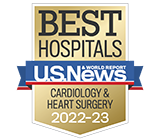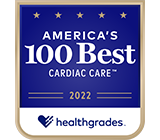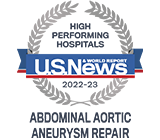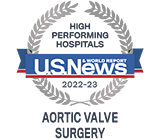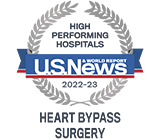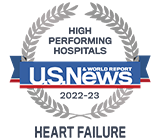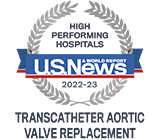Morristown Medical Center
The Atlantic Aortic Center at Morristown Medical Center provides a comprehensive, innovative approach to patients with thoracic aortic disease such as aortic aneurysm, aortic dissection, bicuspid aortic valve, connective tissue disorders, and other aortic pathology.
The aorta is the largest artery in the body and carries oxygen-rich blood from the heart to the body. Left untreated, disease of the aorta can quickly escalate into life-threatening emergencies.
Our multidisciplinary approach combines the expertise of the world-class surgical team at Gagnon Cardiovascular Institute with the knowledge of professionals in relevant medical fields such as vascular surgery, genetics, radiology, and cardiology.
Together with you and your loved ones we will devise a treatment plan that balances the risks and benefits of the available medical interventions.
Our strategies range from active surveillance (evaluating your aortic disease and working with your primary doctor to ensure proper monitoring and follow up) and medical management to transcatheter (less invasive) and or conventional open heart surgical procedures to treat the underlying problem.
Conditions We Treat
-
Thoracic aortic aneurysms
-
An aortic aneurysm is an abnormal enlargement of the aorta. If the aneurysm occurs in the chest, it is considered a thoracic aortic aneurysm. This would include an aneurysm in the first portion of the aorta (ascending aortic aneurysm), the portion of the aorta that supplies blood to the arms and brain (aortic arch aneurysm) and the portion of the aorta that continues on to the abdomen (descending aortic aneurysm). If the aneurysm involves the portion of the aorta that arises from the heart itself and contains the aortic valve, it is considered an aortic root aneurysm. Aneurysms that extend from the chest to the abdomen are considered thoracoabdominal aorta aneurysms.
-
Aortic dissections
-
An aortic dissection is a potentially life-threatening tear in the wall of the aorta that can disrupt blood flow and could potentially rupture, causing fatal bleeding. When an aortic dissection occurs in the first portion of the aorta (the aortic root or ascending aorta), it is considered a Type A aortic dissection and requires emergency surgery. A dissection elsewhere in the aorta is considered a Type B aortic dissection, and is also a medical emergency. There are a variety of treatment possibilities that our team will consider in treating a Type B dissection.
Other conditions that are similar to an aortic dissection are an intramural hematoma (IMH) or a penetrating aortic ulcer (PAU) in which there is abnormal flow of blood in between the layers of the aortic wall. These are often treated in the same way as an aortic dissection. Aortic dissections, intramural hematomas and penetrating aortic ulcers are generally are associated with chest and back pain.
-
Bicuspid aortic valve disease
-
A bicuspid aortic valve is an abnormality of the aortic valve that develops before birth. Aortic valves generally have three “leaflets” or “cusps” that allow blood to flow through them when the heart beats, and close together when the heart is filling to prevent blood from flowing backward. If these leaflets fuse together in utero, there are two functional “cusps” instead of three. This is considered a bicuspid aortic valve. Later in life, this can lead to a leaking valve (aortic insufficiency or aortic regurgitation) or premature degeneration of the valve (aortic stenosis). Bicuspid aortic valves are often associated with, or can lead to, aortic aneurysms.
-
Connective tissue disorders
-
There are a variety of inherited disorders where there is a defect in body's connective tissues, which can affect the aorta and can lead to aneurysms and dissections. These connective tissue disorders include Marfan Syndrome, vascular Ehlers-Danlos Syndrome (VEDS), Loeys-Dietz Syndrome (LDS), familial thoracic aneurysm and dissection (Familial TAAD) and others. Treatment options range from active surveillance to surgical repair. Some of the patients who are referred to our center for aortic aneurysms will work with our team of cardiologists and genetics specialists to evaluate for a connective tissue disorder, which may include screening family members.
-
Traumatic aortic injury
-
Occasionally the aorta can be injured as the result of an accident or a trauma. The treatment options may vary depending on the location and severity of the injury and may range from requiring an emergency procedure to active surveillance.
-
Other aortic conditions
-
- Aortic aneurysms (thoracic, thoracoabdominal)
- Aortic arch aneurysms (Takayasu's Arteritis)
- Aortic arch syndrome
- Aortic insufficiency (Takayasu arteritis)
- Aortic intramural hematoma
- Aortic occlusive disease
- Aortic penetrating ulcer
- Aortic pseudoaneurysm
- Aortic valvular disease, including aortic stenosis
- Aortitis
- Bicuspid aortic valve
- Congenital and hereditary aortic defects, including Marfan syndrome
- Degenerative aortic disease
- Mycotic aortic aneurysm
- Traumatic aortic injury
- Type A and Type B aortic dissections
Meet Our Aortic Center Surgical Team
Our multi-disciplinary team includes highly-trained and compassionate medical professionals, dedicated to providing a high-level support for patients at every step of the heart care journey.
Request More Information
Please use the form to request more information.
All fields are required.
Please note that this form is for North American residents only.
Awards and Accreditations
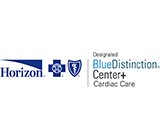
Morristown Medical Center

Coronary Care Unit and Cardiac Unit winner of the silver-level Beacon Award for Excellence from the American Association of Critical Care Nurses



